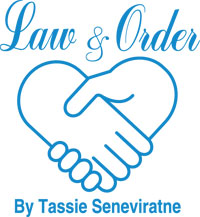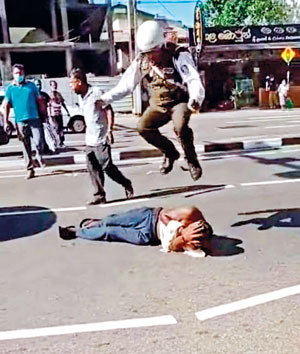Sunday Times 2
Traffic cop stomping on a suspect: The unanswered question
View(s):The incident of the behaviour of the Maharagama traffic cop on March 29 has riveted public attention severely. Judging from media reports including videos, this is an abominable attack on a hapless person who was not aggressive or resisting arrest. The incident went viral and it traumatised those who witnessed it. In addition, it attracted an embarrassing comparison with the case of George Floyd who died when a police officer in Minneapolis in Minnesota, the United States, pressed his neck down with his knee.
 The Maharagama incident is even more significant in that it is one of a series of other incidents of brutal assault by police. Similar cases have also been reported from Peliyagoda, and Gokeralla. But these cases did not grab the attention as that of the Maharagama incident. Their relevance to each other is, however, in the fact that violence at the hands of police is but a recurring feature; and the recent incident is one of a series.
The Maharagama incident is even more significant in that it is one of a series of other incidents of brutal assault by police. Similar cases have also been reported from Peliyagoda, and Gokeralla. But these cases did not grab the attention as that of the Maharagama incident. Their relevance to each other is, however, in the fact that violence at the hands of police is but a recurring feature; and the recent incident is one of a series.
The people who saw this were disturbed in their ethics and principles they were long accustomed to. The values and traditions the people long upheld troubled them, judging by their response to the incident. Disruption of their sense of ethics, values that sustained their lives, the traditions they were heir to, all caused them much distress. That in effect was the incident. Is it not that the ethics, values, principles and traditions are also built on religion and beliefs? Are all these, which make for dignity and culture, of little effect as this recent incident revealed? Dignity of public office is the concern here, leaving aside human dignity for the moment.
The George Floyd case and the case of Sri Lankan traffic cop stomping a suspect brought out many comparable issues for policing and other surrounding issues that may be discerned, such as class discrimination.
In an interview with the Police, a journalist asked about these repeated assaults on suspects. Answers were given by the Police media spokesman (PMS). The question still remains unanswered and reasons given appear blurry in mid-air. The media interview, however, was useful in that it gave a platform to advance other views.
At this interview, the PMS attempted to tender a legal aspect to account for the incident. His legal account was just a quibble to avoid the question.
If the law was insufficient to explain why these repeated assaults on suspects take place, apart from the case of the traffic cop stomping the ‘suspect’, other aspects may help to understand. For this incident also raises the question of supervision against recurrence of such misconduct. All these law issues apart, there does not appear to be any administrative check or curb on these assaults by police on suspects from any of the other authorities who are obliged to exercise control. As a result, such assaults by police on suspects, escapes of suspects from police custody, disappearances, introduction of drugs on suspects to cover up the assault charges, and a run of such reported incidents, are very much the order of the day. Interdictions for the moment are done. Follow up after the moment of interdiction to arrest the deterioration of the situation, is left to the imagination because the problem remains in their repeated incidence.

The Maharagama incident that went viral on social media
Failure of supervision, therefore appears another possible answer to the question posed — why these repeated assaults on suspects? The issue is then not only misconduct of the miscreant officer, but, more importantly, failure of supervision of the police service to check misconduct. To this question, too, the interviewer did neither ask nor was given an answer. If the police service itself is in default, what is the role of the Secretary and the Minister of Police?
Failure of supervision can mean, in this context, an administrative failure. But failure has an added dimension in the tone set by the superiors and it regulates the conduct of the subordinates. In fact, this incident reflects on the tenor of the more powerful superior and his direction.
What then of the Police Commission? On the Gokerella assault, the Police Commission evades the issue. The Police Commission only reports that police were wrong in not allowing the suspect to sit for the examination that was due. The Police Commission does not speak anything about the charges the suspect makes against the police of assault and making false charges of possession of drugs etc. The Police Commission does not appear to be serving its purpose. Despite the publicised high-sounding strategic plans drawn up by the Police Commission, little has proceeded beyond.
Another type of such assault or confrontation is of police vis-à-vis lawyers; this too only at police stations. Over some of these incidents, special laws or regulations have been passed in favour of lawyers visiting police stations. Hitherto all who visit police stations were safeguarded by one law. This includes Buddhist priests and all others who visit police stations in their numbers, and for over one hundred and fifty years of police experience with little let or hindrance. What then is the problem with lawyers visiting police stations, only very recently, only since about twenty to thirty years?
The problem is in supply and demand. Supply of issues for lawyers is now very limited because of the influx of law professionals, and, as a result, their action is heightened. There is conflict in the wake of these issues at police stations as practice in courts is limited. Special laws for lawyers have been considered in the wake of this. But there is inequality and unequal treatment by this law. Such issues did not engage the media interview with the PMS.
The question, why then are these continuing assaults by police on suspects in custody, still beckons some other answer. The Attorney General finds himself in no role in this situation unless matters are referred to him. The Bar Association (BASL) will distance itself from such incidents out of expediency. What then of the Judiciary? The Judiciary will come into the picture only on a rights issue. There is, however, Constitutional provision for democracy and socialism governing all these aforementioned authorities including the Judiciary. However, there is no impetus or impulse given to check that which is neither democratic nor socialist, in continuing assaults against the people, of which all these authorities are obliged to prevent. But police are the easy bashing boys for everyone, worst by the media.
I remember, in the late 1950s and early 1960s, the courts calling for immediate reports from the police when any misdemeanor is revealed or suggested in the media, and making strictures on errant police officers. This kept all police officers from top to bottom, on their toes. That supervision is now unheard of.
Taking in all the aforesaid, the one thing clear is that the instituted means are not delivering. It is inevitable therefore that the police have been either left to their own devices or even have been encouraged otherwise towards these untoward incidents of misconduct. More pertinently, is the traffic cop stomping the suspect simply taking the tone set for him? The answer to the Media question, WHY these continuing assaults on suspects, is now anybody’s guess. This suggests the situation is pathetically parlous. A more competent media interview would be useful in the wake of all this, to discuss the problem in correct perspective.
(The writer is Retired Senior Superintendent of Police. He can be contacted at seneviratnetz@gmail.com.
TP 077 44 751 44)


